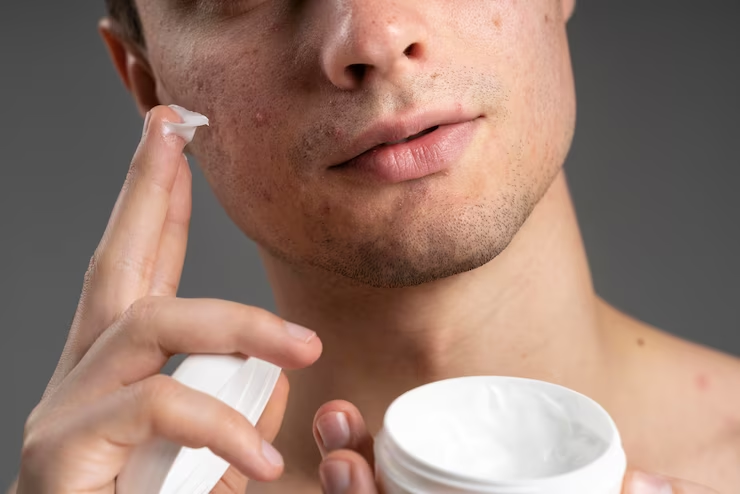
Dealing with acne can be a real challenge, causing frustration and self-consciousness for many people. It's the bane of many individuals seeking smooth, clear skin and has sparked numerous discussions on potential remedies. One intriguing question often arises is, "Do cold showers help acne?"
If you're seeking clearer skin, you've likely explored numerous remedies and treatments. But have you ever considered the potential benefits of something as simple as a cold shower? This blog post will investigate whether cold showers help with acne. We'll explore its theory, examine scientific research, and seek expert opinions to separate fact from fiction. Keep reading!
Understanding Acne
Acne is a common skin condition that affects millions of individuals worldwide. It occurs when hair follicles become clogged with oil, dead skin cells, and bacteria, forming various types of blemishes like whiteheads, blackheads, and inflamed pimples.

Causes of Acne
Acne is influenced by a combination of factors, including:
Excess Sebum Production:
Sebaceous glands in the skin produce sebum, an oily substance that helps keep the skin moisturized. However, excessive sebum production can contribute to the development of acne.Dead Skin Cells:
Shedding dead skin cells is a natural process, but when these cells accumulate and mix with sebum, they can clog pores and contribute to acne formation.Bacterial Activity:
Propionibacterium acnes, a type of bacteria on the skin, can multiply within clogged pores, leading to inflammation and acne lesions. Hormonal Influences: Fluctuations in hormone levels, particularly during puberty, menstrual cycles, or hormonal imbalances, can stimulate sebum production and increase the likelihood of developing acne.Types of Acne
Acne can manifest in different forms, including:
Whiteheads:
Closed comedones that appear as small, flesh-colored bumps beneath the skin's surface.Blackheads:
Open comedones characterized by dark spots caused by sebum oxidation and debris within the pore.Papules:
Inflamed, red bumps that are typically tender to the touch.Pustules:
Similar to papules but filled with pus, giving them a white or yellowish appearance.Nodules:
Large, painful bumps that develop deep within the skin can be persistent and difficult to treat.Cysts:
Deep, pus-filled lesions that can cause pain, scarring, and a higher risk of infection.Common Acne Treatments
Various treatment options are available to manage acne, including:
Topical Medications:
Over-the-counter or prescription creams, gels, or lotions containing benzoyl peroxide, salicylic acid, or retinoids can help reduce acne-causing bacteria, unclog pores, and control oil production.Oral Medications:
In more severe cases, dermatologists may prescribe oral antibiotics, hormonal medications (such as oral contraceptives), or isotretinoin, a powerful medication used to treat severe acne.Professional Treatments:
Dermatological procedures like dermabrasion, laser therapy, or extractions performed by trained professionals can help improve acne and minimize scarring.The Theory Behind Cold Showers and Acne
Can something as simple as a cold shower help in the battle against acne? This question has intrigued many seeking natural remedies for clearer skin. The underlying theory suggests that cold showers may impact acne through several mechanisms. Let's uncover the truth together and find out: Do cold showers help acne?

Skin Pore Constriction
One proposed mechanism is the constriction of skin pores caused by cold water. Cold temperatures can cause the blood vessels near the surface of the skin to constrict, leading to a tightening effect on the pores. It is believed that smaller, constricted pores are less likely to become clogged with sebum, dead skin cells, and bacteria, potentially reducing the occurrence of acne breakouts.
Decreased Sebum Production
Cold showers may also influence sebum production. The cooler temperature can potentially suppress sebaceous gland activity, reducing sebum production. Since excessive sebum production contributes to clogged pores and acne formation, regulating sebum production through cold showers might help manage acne symptoms.
Anti-Inflammatory Effects
Inflammation plays a significant role in the development and progression of acne. Cold showers, particularly when applied directly to inflamed areas, may provide localized relief and help soothe irritated skin. Cold temperatures can temporarily numb the nerve endings, providing a mild analgesic effect and potentially reducing inflammation.
Improved Blood Circulation
Cold showers are thought to stimulate blood circulation, promoting overall skin health. Enhanced blood flow can facilitate the delivery of nutrients and oxygen to the skin cells, supporting their renewal and regeneration processes. This improved circulation may aid in maintaining a healthy skin barrier and reducing the likelihood of acne formation. Cold showers are found to help with collagen production which can increase overall skin health and fight aging. Increasing blood circulation redistributes blood to skin, and delivers freshly oxygenated blood to areas of the body that need recover and repair, such as acne affected skin.
While these theories suggest potential benefits, it's important to note that the scientific evidence supporting the direct impact of cold showers on acne is limited. The effects may vary depending on individual factors such as skin type, severity of acne, and overall skincare routine. It is important to note that cold shower therapy is not the primary treatment for any condition, and conclusive research is still limited. Therefore, you can use cold showers as an added remedy for acne but not as a sole treatment method.
Expert Opinions and Recommendations
Do cold showers hold the potential to alleviate acne, or is it just a myth? When finding answers, it's essential to turn to the experts. That's why we turn to dermatologists and skincare experts to shed light on the age-old question: Do cold showers help acne?
Dermatologists' Views
Many dermatologists agree that cold showers alone are unlikely to be a comprehensive solution for treating acne. They emphasize the importance of a holistic approach to skincare that includes consistent cleansing, proper moisturization, and targeted acne treatments. Cold showers may offer some benefits but are generally seen as just one piece of the larger puzzle.
, MD, a board-certified dermatologist in Miami, Florida, offers insights into the potential effects of cold showers on acne. Dr. Woolery-Lloyd states, "cold showers may provide symptomatic relief for individuals with acne, such as temporary reduction in redness and inflammation." The cold water can create a soothing sensation and potentially constrict blood vessels, temporarily improving the appearance of acne lesions.However, she emphasizes that cold showers do not address the underlying mechanisms that lead to acne formation. Acne is a complex condition influenced by excess sebum production, hormonal fluctuations, and bacterial activity. Cold showers alone cannot directly target these factors or regulate them effectively.
a board-certified dermatologist in Cambridge, Massachusetts, offers an interesting perspective on the potential benefits of cold showers for acne. Dr. Hirsch suggests that "cold showers may positively impact inflammation, a key component of acne."Cold water can help constrict blood vessels and reduce swelling, potentially leading to a temporary improvement in the inflammatory aspect of acne. Cold showers can alleviate some of the discomfort associated with inflamed acne lesions and improve their appearance by providing a soothing and cooling effect.
Skincare Routine
Experts often emphasize the significance of establishing a regular skincare routine tailored to an individual's skin type and specific acne concerns. This typically involves gentle cleansers, non-comedogenic moisturizers, and acne-fighting ingredients such as benzoyl peroxide or salicylic acid.
While cold showers may have potential benefits, they are usually recommended as part of an overall skincare regimen rather than a standalone solution.
Individual Variations
Expert opinions also stress that everyone's skin is unique, and what works for one person may not work for another. Some individuals may find cold showers soothing, while others may experience dryness or increased sensitivity. It's essential to pay attention to how your skin responds and make adjustments accordingly.
Cold Compresses
Experts often suggest using cold compresses in inflamed acne lesions rather than relying solely on cold showers. Applying a cold compress directly to a pimple can help reduce swelling and soothe the area temporarily. However, this localized application may not address the underlying causes of acne and should be combined with other appropriate treatments.
Consulting a Dermatologist
Ultimately, consulting with a dermatologist or skincare professional for personalized advice is advisable. They can assess your specific skin condition, severity of acne, and overall health to recommend a comprehensive treatment plan. They may provide insights on incorporating cold showers or therapies into your routine. Still, they can also guide you toward evidence-based effective treatments for managing acne.
Other Factors to Consider
While exploring the potential effects of cold showers on acne, it is crucial to consider other factors that can influence the development and management of acne. Acne is a complex skin condition influenced by genetic, hormonal, environmental, and lifestyle factors.
Here are some important considerations:
Skincare Routine
A consistent and appropriate skincare routine plays a vital role in managing acne. This includes gentle cleansing, non-comedogenic products, and applying acne treatments as dermatologists recommend. Cold showers may provide additional benefits if incorporated into a well-rounded skincare routine, but they should not replace essential skincare practices.
Diet and Lifestyle
Dietary choices and lifestyle habits can impact acne. Some studies suggest that certain foods, such as high-glycemic-index carbohydrates and dairy products, may contribute to acne formation in susceptible individuals. Maintaining a balanced diet and adopting a healthy lifestyle that includes regular exercise, sufficient sleep, and stress management can help support overall skin health.
Hormonal Influences
Hormonal fluctuations can contribute to acne, particularly during puberty, menstruation, pregnancy, or certain medical conditions. Understanding the hormonal factors involved and seeking appropriate medical guidance, including hormonal therapies if necessary, may be essential for effectively managing hormonal acne.
Skincare Products
The use of certain skincare products can exacerbate acne. Choosing non-comedogenic or oil-free products specifically formulated for acne-prone skin is important. Removing makeup thoroughly and cleansing the skin before bed are crucial to preventing clogged pores and breakouts.
Psychological Factors
Psychological factors like stress, anxiety, and low self-esteem can influence acne. Stress management techniques such as yoga and meditation, seeking emotional support, and maintaining a positive mindset can contribute to overall well-being and potentially help manage acne.
Some drawbacks of cold shower therapy;
If you suffer from cold urticaria (hives) skin reaction that occurs due to cold exposure or Raynaud's phenomenon which causes numbness of your fingers and toes and bluish discoloration to cold exposure, cold showers as a remedy for acne may not be an option for you.
Conclusion
In conclusion, while cold showers on acne may offer certain benefits, it's important to consider the broader context of acne management and address other factors contributing to its development. By adopting a comprehensive approach that considers skincare routines, dietary habits, hormonal influences, product choices, and psychological well-being, individuals can optimize their efforts in managing and improving acne-prone skin.







